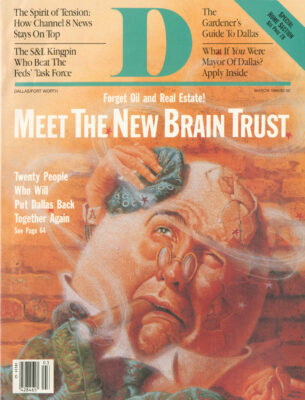Every couple of years some City Council member suggests selling WRR, the city-owned classical station. Why? The station makes a few thousand dollars profit in most years, but it has an estimated commercial resale value of about $12 million.
That large book value is why, last September, council member Al Gonzalez demanded that the city lease WRR, sell it, or form a joint venture with another investor to squeeze out more of the station’s value. But the council didn’t want to risk the wrath of vocal WRR supporters and spun the question off to Charles Tandy’s arts committee, where it was spun off again to a citizen subcommittee to figure out how to make some cash with WRR. Now, six months later, a solution seems no closer.
Member Ken Fairchild says Tandy told the subcommittee that it could study any recommendation for WRR except selling it. With that door shut, Paul Gleiser who offered to buy WRR a couple of years ago for $6.6 million (plus a guarantee to pay the city $5 million if he ever sold the station or changed its classical format), proposed a plan to create a corporation wholly owned by the city and operated as a separate entity. The plan had support from Tandy and subcommittee members, but City Attorney Annies lie Muncv said that it couldn’t be done under state law. Council member Max Wells recommended leasing the station or hiring an outside management firm to run it, but Muncy nixed that idea, too. “The problem with this is they want us to write it to guarantee that the format will never change, and you just can’t do that,” she says.
The subcommittee’s only other choice was to ask the WRR staff for recommendations on how it could improve its operations to produce more money in the future. Tandy says that the city should kick in “several tens of thousands of dollars” to boost WRR.
General manager Maurice Loewenthal says he could use that money to buy media promotions “to try and increase our share of the audience.” But he says there is no certainty this strategy will work. He says classical stations usually have low market shares (WRR has a daily audience of around 100.000 people) and that WRR is able to sell advertising because typical classical music listeners are among the most affluent and well educated, not because the station lays claim to a huge market share. Typical radio marketing, says Loewenthal, simply does not work with WRR. “Comparing this station to other commercial stations,” he says, “is like comparing a Van Gogh to a cartoon.”
Meanwhile, some subcommittee members fear that their recommendations may not only cost the city money, but might not even work. And Fairchild says the radio station will remain a tempting target, especially in lean economic times. “If the city ever needs the $12 million that WRR is worth, then this issue will come up again. This is absolutely a temporary solution.”
Related Articles

Arts & Entertainment
VideoFest Lives Again Alongside Denton’s Thin Line Fest
Bart Weiss, VideoFest’s founder, has partnered with Thin Line Fest to host two screenings that keep the independent spirit of VideoFest alive.
By Austin Zook

Local News
Poll: Dallas Is Asking Voters for $1.25 Billion. How Do You Feel About It?
The city is asking voters to approve 10 bond propositions that will address a slate of 800 projects. We want to know what you think.

Basketball
Dallas Landing the Wings Is the Coup Eric Johnson’s Committee Needed
There was only one pro team that could realistically be lured to town. And after two years of (very) middling results, the Ad Hoc Committee on Professional Sports Recruitment and Retention delivered.


